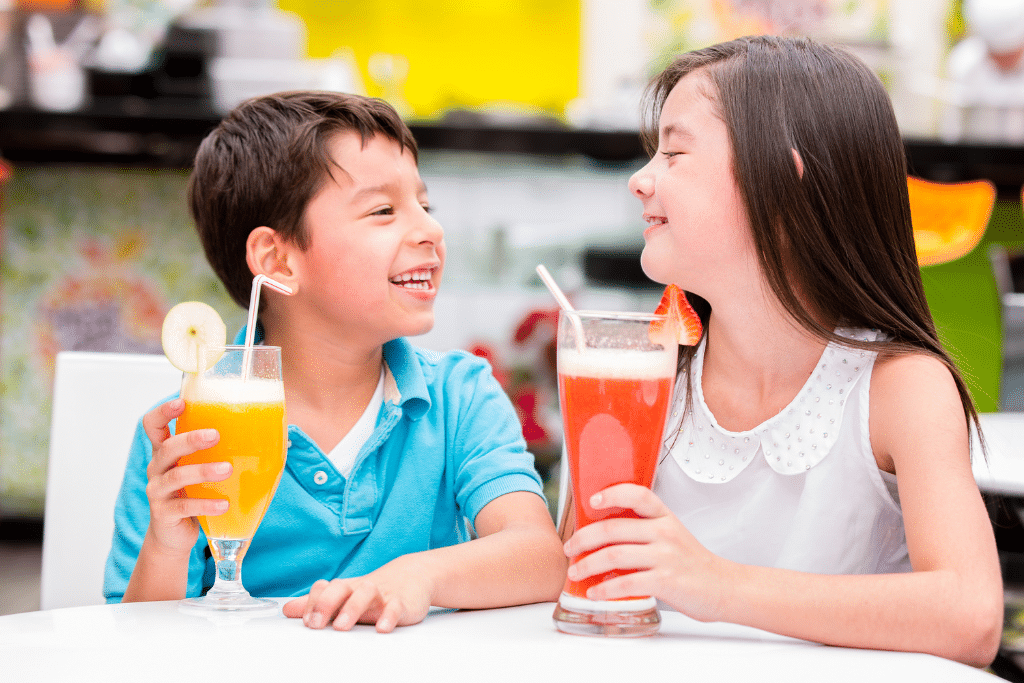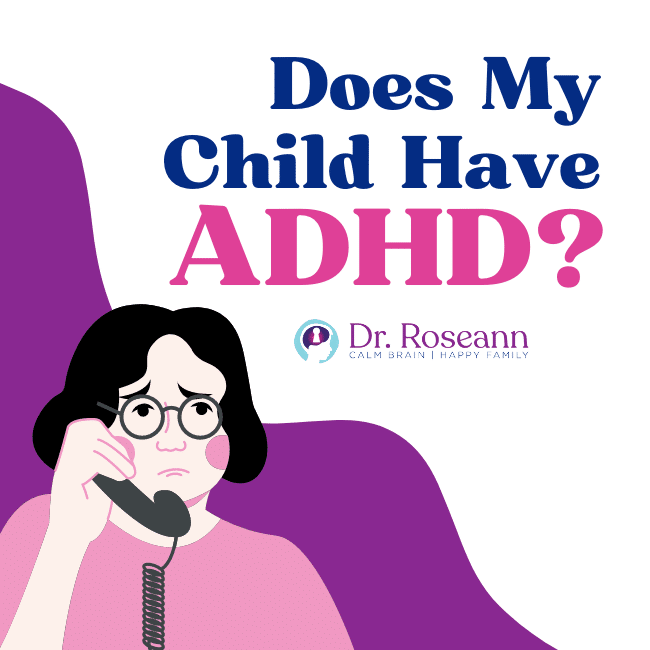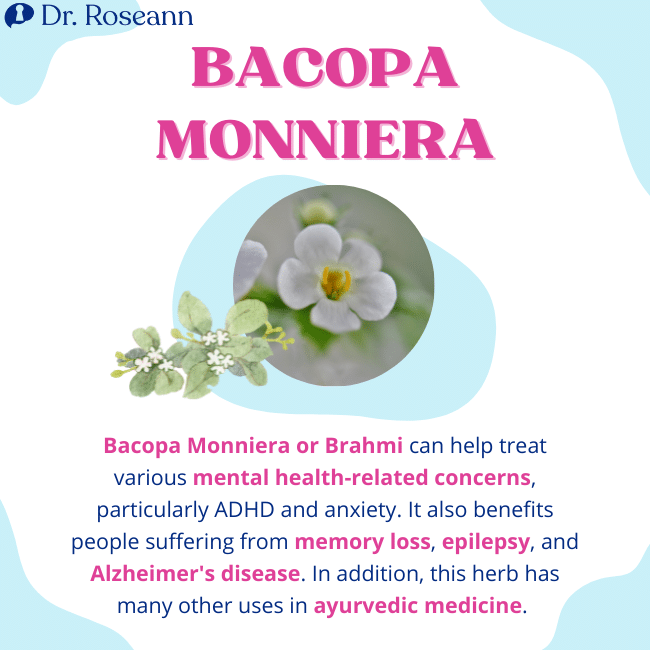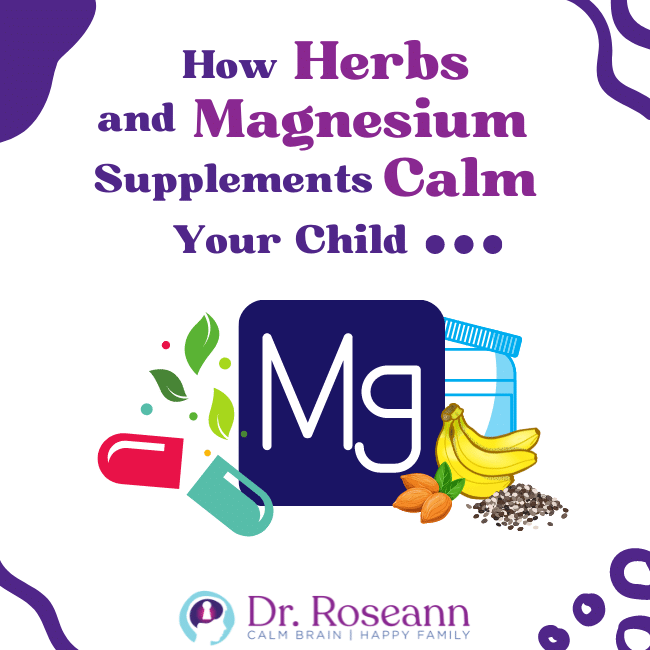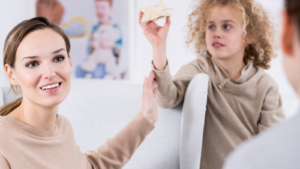Some parents think that only stimulant medications can help their child with attention-deficit hyperactivity disorder or ADHD. However, there are many non-pharmacological treatments available as well. While most doctors will offer an ADHD medication first, there are natural supplements and herbs that work as alternative therapies.
Science-backed non-medical therapy and treatments for ADHD, combined with proper guidance, can also create long-term positive effects for your kid.
Research shows that specific alternative and complementary methods can help manage ADHD and that certain herbs can help improve hyperkinetic and attentional disorders through a combination of sedative and cognitive enhancing effects (Sarris et al., 2011).
There are non-medication alternatives that can support the brain of a child with ADHD. There are many reasons not to medicate a child or a teen with ADHD but they do need to take action to support the ADHD brain and behavior.
Does My Child have ADHD?
It is not easy to know if your child has attention deficit disorder unless you take them to our Ridgefield center for a professional assessment. However, parents can check for specific symptoms of hyperactivity in their child. The most common ADHD symptoms are:
Inattention
Kids with ADHD often fail to give attention to details. As a result, they make careless mistakes when doing everyday tasks and activities, or fail to finish anything they've started.
It would seem that they don't listen or can't follow instructions and find it hard to organize their tasks. As a result, they often avoid doing anything that requires too much mental effort for an extended time.
Children with ADHD seem to lose many things. Aside from being forgetful, they also get easily distracted. They may also exhibit some behavioral problems along the way.
Hyperactivity
Without a doubt, hyperactivity is the most observable symptom of children with ADHD. If you see kids constantly fidgeting with something, squirming in their seats, or tapping their hands or feet often, they likely have ADHD.
You can't make these kids stay seated, as they would instead climb around or jump about the area. As expected, these kids can't play quietly. They are always up and about and talk excessively.
Impulsivity
For children with ADHD, being impulsive and hyperactive go hand-in-hand. One can't exist without the other. Children may be tagged as impulsive if they often blurt out answers before hearing the entire question.
These children are also likely to intrude or interrupt other people. For example, they often butt into other kids' games and conversations. They also find it difficult to wait for their turn.
Herbs for Kids with ADHD
If your child has ADHD, don't lose hope. Our Ridgefield center treats children with mental health issues using natural, science-backed methods that work efficiently without the harsh side effects of ADHD medications. We also use QEEG Brain Mapping and Neurofeedback to diagnose and treat ADHD.
Aside from the different methods we use at the center, there are other natural ways to address ADHD, and the use of certain herbs is one of them. Let's do a deep dive into what these herbs are and how they benefit kids with ADHD
Bacopa Monniera
Bacopa Monniera or Brahmi can help treat various mental health-related concerns, particularly ADHD and anxiety. It also benefits people suffering from memory loss, epilepsy, and Alzheimer's disease. In addition, this herb has many other uses in ayurvedic medicine.
One study aims to determine the efficacy of Bacopa monnieri extract in managing ADHD symptoms in kids. Research shows that Bacopa monnieri standardized extract effectively addresses ADHD symptoms in kids and that they were able to tolerate the treatment well (Dave et al., 2014).
Ginseng
Ginseng is a popular herb with a few variations, the most popular of which are American and Korean ginseng. While this herb acts as a cognitive stimulant, it doesn't have any harsh side effects, unlike most ADHD drugs. Ginseng can help children and teens become less impulsive.
One study tested the clinical effects of Korean red ginseng on children with ADHD. A group of 18 children and teens diagnosed with ADHD whose ages ranged from 6 and 14 years old were given ginseng supplements for eight weeks.
After the test period, there were significant differences in the subject's ADHD scores before and after treatment. Results indicate that red ginseng can effectively promote attentiveness in children with ADHD. This herb can complement an ADHD therapy that involves conventional treatments (Lee et al., 2011).
Blueberry Extract
Blueberries have a lot of neurocognitive benefits, which can directly benefit children with ADHD. This plant extract can stimulate brain activity in regions that influence executive functioning. Like magnesium, the consumption of blueberry extract also improves a child's cognition and mental abilities.
One study that delved into the effects of blueberry supplements on school-aged children ages 7 to 10 years old shows a boost in the subject's executive functions, mood, and short-term memory (Barfoot et al., 2018).
Ginkgo Biloba
Ginkgo Biloba is popularly used to help increase mental sharpness and improve memory. It also helps boost children's short attention spans and supports their healthy brain function.
This herb contains flavonol glycosides that have antioxidant properties. When taken in the right dosage, it can help prevent ADHD by reducing oxidative stress and promoting healthy brain activities.
One study sought to test the effects of Ginkgo Biloba on 20 children with ADHD. Each of them was given Ginkgo Biloba supplements for 3-5 weeks depending on their conditions. The dosage is also increased as needed if the symptoms persisted.
Following the administration, there was a significant improvement in the children's symptoms and performance. There are also low rates of side effects noted (Uebel-von Sandersleben et al., 2014).
Rhodiola Rosea
Rhodiola Rosea has properties that promote brain focus and executive functioning. In addition, this herb acts as an adaptogen that protects the brain from different stressors.
This herb elevates serotonin, norepinephrine, and dopamine levels in the brain. As a result, it enhances one's alertness level, which often lacks in children with ADHD.
Studies have shown that this herb supports the different aspects related to brain processing, such as executive functioning, learning, attention, stress, and fatigue.
One study tested Rhodiola Rosea's efficacy for depression. Results show its anti-depressive potency for moderate depression when given in the right dosage and consistency for six weeks (Darbinyan et al., 2007).
Pycnogenol
Pycnogenol is an herbal extract obtained from the bark of French maritime pines. Also referred to as pine bark extract, this herb is known to balance stress hormones while lowering dopamine and adrenaline levels, which in turn, reduces the severity of ADHD symptoms. It is important to find natural ways to support stress and learn healthy coping skills for lifelong mental wellness.
A clinical trial tested pycnogenol on 61 children with ADHD. The children took either pycnogenol supplements or a placebo for four weeks. Results show that after a month of Pycnogenol administration, there were reduced instances of hyperactivity among children in the control group. They also exhibited improved attention, concentration, and visual-motoric coordination (Trebatická et al., 2006).
Avena Sativa
Avena sativa is an extract obtained from wild oat seeds or green oats. This herbal medicine strengthens the nervous system and addresses exhaustion associated with stress and depression. It can help children who feel tired and burnout from their ADHD symptoms.
One study conducted on 132 individuals who were given either Avena Sativa supplements or a placebo for 29 days confirms the cognitive effects of this herb. Green oats or Avena Sativa can improve cognitive functions and modulate physiological responses to stressors and other environmental factors (Kennedy et al., 2020).
Valerian Root
Valerian Root or Valeriana Officinalis is a plant that grows wild in grasslands, and it has been a popular herbal remedy for many years. When used as a herbal supplement for ADHD, it calms hyperactive tendencies, although it may not improve one's concentration.
Valerian also promotes deep sleep while lessening the rebound effect that some kids experience when they're on ADHD medications. Some adults even take it to cure nervous tension and insomnia triggered by anxiety. Valerian has been used for centuries as a potent herbal remedy to promote brain health.
A study on Valerian Root on kids with ADHD produced positive results. It helped improve hyperactivity, impulsiveness, and concentration difficulties in children with ADHD after seven weeks of herbal treatment. Valerian Root combined with lemon balm extracts to produce such results (Gromball et al., 2014).
Lemon Balm Extract
Also called Melissa Officinalis, this herb acts as a mild sedative. It is also an antibacterial and spasmolytic agent. This herb comes in bright aromatic leaves and can address mood swings while increasing focus.
Lemon balm is commonly combined with Valerian Root to produce positive outcomes for kids with ADHD. It helps address the symptoms of overstimulation, anxiety, anger, frustration, and irritation. It is a calming herb that also can used as an essential oil.
In a study that tested lemon balm extract on twenty participants, results indicate that the ingestion of acute doses of lemon balm extract can modulate one's mood and cognitive performance (Kennedy et al., 2002).
Gotu Kola
Gotu Kola, or Centella Asiatica, is an herb with high antioxidant properties that can help increase mental function, cognition, and memory. It enhances brain functions not by stimulating it but by mildly relaxing the brain so that it settles down and calms itself.
One study on Gotu Kola's effect on mood and cognitive function shows that this herb may improve one's working memory. When Gotu Kola combines with other herbs in this list, a person's concentration, attention span, and executive functioning will start to increase. This herb also helps address mood disorders by reducing anger and improving self-reported alertness (Puttarak et al., 2017).
How Herbs and Magnesium Supplements Calm Your Child
You're at the right place if you're a parent seeking a way to treat your child's ADHD symptoms without using drugs. Natural supplements are better for young people in many ways, but primarily because of their milder side effects, if any at all, compared to ADHD drug administration.
These natural herbs can help improve focus and attention in kids with ADHD, reducing its impact on their daily lives. In addition, each herb has corresponding scientific studies to prove its efficacy in addressing the condition.
If your kid was recently diagnosed with ADHD and you're looking for alternatives, our science-backed natural options can help. Take time to understand the benefits and limitations of all these natural remedies to make the best decision for your child. Remember that your choice of treatment will affect not just your kid but other family members as well.
With all these science-backed herbal remedies and natural treatment options, more and more parents are discovering better alternatives as they seek safe yet practical approaches to treating ADHD. These alternative treatments not only address the root causes of ADHD but also create lasting changes for your child.
Most of these herbs are in the formulation of the magnesium supplement available at our Ridgefield center. Magnesium deficiency results in stress, lack of sleep, and the exacerbation of mental health issues such as ADHD and anxiety.
Ginkgo and Ginseng for ADHD: A Potent Combination
Understanding the Benefits: Ginkgo Biloba and Ginseng are renowned for their cognitive-enhancing properties. In the context of ADHD, these herbs are believed to offer significant benefits. Ginkgo, known for improving blood flow to the brain, may enhance focus and memory, while Ginseng is celebrated for its ability to increase mental alertness and reduce fatigue, which are common challenges in ADHD.
When combined, Ginkgo and Ginseng may offer a synergistic effect. Ginkgo's potential in boosting cognitive function and Ginseng's efficacy in enhancing stamina and concentration can be particularly beneficial for individuals with ADHD, who often struggle with sustained attention and cognitive fatigue.
Numerous studies have explored the effects of these herbs on cognitive functions. While some research indicates positive outcomes, it's crucial to consider their safety profiles. Generally, both Ginkgo and Ginseng are well-tolerated, but consulting with a healthcare professional before starting any herbal regimen is essential, especially for those with pre-existing health conditions or those taking other medications.
ADHD Herbs and Supplements: A Holistic View
The use of herbal supplements for ADHD varies across different age groups. For children, the focus is often on gentle herbs like Chamomile or Lemon Balm, which have calming effects. In adults, stronger adaptogens like Rhodiola may be more appropriate, potentially aiding in stress management and cognitive function.
Integrating Supplements into ADHD Management: Herbal supplements can be a part of a comprehensive ADHD treatment plan that includes behavioral therapy, lifestyle changes, and dietary adjustments. Supplements like Omega-3 fatty acids, Magnesium, and Zinc are often recommended for their neuroprotective and cognitive-enhancing properties.
It's essential to tailor herbal treatments to individual needs. Factors like the severity of symptoms, age, lifestyle, and other health conditions should guide the choice of supplements.
Herbal Supplements for ADHD Adults: Tailoring Treatment for Maturity
Adults with ADHD may face different challenges than children, including higher stress levels, different social expectations, and varied responsibilities. Therefore, supplements for adults often focus on managing stress, enhancing focus in a work environment, and improving overall cognitive function and ability to focus.
Herbs like Ginseng, Ginkgo, and Rhodiola can be particularly beneficial for adults. These not only help in managing typical ADHD symptoms but also address stress and anxiety, which are often comorbid with adult ADHD.
For adults, lifestyle factors such as diet, exercise, and sleep patterns play a crucial role in managing ADHD symptoms. Supplements should be integrated with a healthy lifestyle for optimal benefits.
Herbal Treatments for ADHD: Traditional Wisdom and Modern Research
Traditional herbal treatments for ADHD, such as the use of Ginkgo Biloba or Lion's Mane, have been supported by modern research. Historical uses of these herbs are now being validated through scientific studies, highlighting their potential in improving attention, focus, and cognitive functions.
It's crucial to rely on evidence-based information when considering herbal treatments for ADHD. While traditional wisdom provides a foundation, modern research helps in understanding efficacy, dosage, and safety.
Personalized Herbal Strategies: The choice of herbal treatments should be personalized based on individual symptoms, medical history, and specific needs. What works for one individual may not be as effective for another, emphasizing the need for a tailored approach.
As we promote natural solutions for ADHD and other mental health conditions, we make it easier for you to choose natural remedies that will improve your child's needs without exposing him or her to the known side effects of most ADHD drugs at a very young age. With proper help and guidance and treatment, children with ADHD can grow into happy and healthy adults.
Citations
Askari, G., Hemamy, M., Heidari-Beni, M., Karahmadi, M., & Maracy, M. (2020). Effect of Vitamin D and magnesium supplementation on behavior problems in children with attention-deficit hyperactivity disorder. International Journal of Preventive Medicine, 11(1), 4. https://doi.org/10.4103/ijpvm.ijpvm_546_17
Bach, D., Groesbeck, G., Stapleton, P., Sims, R., Blickheuser, K., & Church, D. (2019). Clinical EFT (Emotional Freedom Techniques) Improves Multiple Physiological Markers of Health. Journal of Evidence-Based Integrative Medicine, 24, 2515690X18823691. https://doi.org/10.1177/2515690X18823691
Burgdorf, V., Szabó, M., & Abbott, M. J. (2019). The Effect of Mindfulness Interventions for Parents on Parenting Stress and Youth Psychological Outcomes: A Systematic Review and Meta-Analysis. Frontiers in Psychology, 10. https://doi.org/10.3389/fpsyg.2019.01336
Centers for Disease Control and Prevention. (2021, September 23). Data and statistics about ADHD. Centers for Disease Control and Prevention. https://www.cdc.gov/ncbddd/adhd/data.html
Ge, W., Ren, C., Xing, L., Guan, L., Zhang, C., Sun, X., Wang, G., Niu, H., & Qun, S. (2021). Ginkgo biloba extract improves cognitive function and increases neurogenesis by reducing Aβ pathology in 5×FAD mice. American journal of translational research, 13(3), 1471–1482.
Gudden, J., Arias Vasquez, A., & Bloemendaal, M. (2021). The Effects of Intermittent Fasting on Brain and Cognitive Function. Nutrients, 13(9), 3166. https://doi.org/10.3390/nu13093166
Gunaseelan, L., Vanama, M. S., Abdi, F., Qureshi, A., Siddiqua, A., & Hamid, M. A. (2021). Yoga for the Management of Attention-Deficit/Hyperactivity Disorder. Cureus. https://doi.org/10.7759/cureus.20466
HATTAPOĞLU, E., BATMAZ, İ., DİLEK*, B., KARAKOÇ, M., EM, S., & ÇEVİK, R. (2019). Efficiency of pulsed electromagnetic fields on pain, disability, anxiety, depression, and quality of life in patients with cervical disc herniation: a randomized controlled study. Turkish Journal of Medical Sciences, 49(6), 1095–1101. https://doi.org/10.3906/sag-1901-65
Puttarak, P., Dilokthornsakul, P., Saokaew, S., Dhippayom, T., Kongkaew, C., Sruamsiri, R., Chuthaputti, A., & Chaiyakunapruk, N. (2017). Effects of Centella asiatica (L.) Urb. on cognitive function and mood related outcomes: A Systematic Review and Meta-analysis. Scientific Reports, 7. https://doi.org/10.1038/s41598-017-09823-9
Sathyanarayana Rao, T., Asha, M., Ramesh, B., & Jagannatha Rao, K. (2008). Understanding nutrition, depression and mental illnesses. Indian Journal of Psychiatry, 50(2), 77. https://doi.org/10.4103/0019-5545.42391
Siebelink, N. M., Bögels, S. M., Boerboom, L. M., de Waal, N., Buitelaar, J. K., Speckens, A. E., & Greven, C. U. (2018). Mindfulness for children with ADHD and Mindful Parenting (MindChamp): Protocol of a randomised controlled trial comparing a family Mindfulness-Based Intervention as an add-on to care-as-usual with care-as-usual only. BMC Psychiatry, 18(1). https://doi.org/10.1186/s12888-018-1811-y
Sprich, S. E., Burbridge, J., Lerner, J. A., & Safren, S. A. (2015). Cognitive-Behavioral Therapy for ADHD in Adolescents: Clinical Considerations and a Case Series. Cognitive and Behavioral Practice, 22(2), 116–126. https://doi.org/10.1016/j.cbpra.2015.01.001
Sprich, S. E., Knouse, L. E., Cooper-Vince, C., Burbridge, J., & Safren, S. A. (2010). Description and Demonstration of CBT for ADHD in Adults. Cognitive and Behavioral Practice, 17(1), 9–15. https://doi.org/10.1016/j.cbpra.2009.09.0024
Xiong, Z., Shi, S., & Xu, H. (2005). A controlled study of the effectiveness of EEG biofeedback training on-children with attention deficit hyperactivity disorder. Journal of Huazhong University of Science and Technology. Medical Sciences = Hua Zhong Ke Ji Da Xue Xue Bao. Yi Xue Ying de Wen Ban = Huazhong Keji Daxue Xuebao. Yixue Yingdewen Ban, 25(3), 368–370. https://doi.org/10.1007/BF02828171
Always remember… “Calm Brain, Happy Family™”
Are you looking for SOLUTIONS for your struggling child or teen?
Dr. Roseann and her team are all about solutions, so you are in the right place!
There are 3 ways to work with Dr. Roseann:
You can get her books for parents and professionals, including: It’s Gonna Be OK™: Proven Ways to Improve Your Child’s Mental Health, Teletherapy Toolkit™ and Brain Under Attack: A Resource For Parents and Caregivers of Children With PANS, PANDAS, and Autoimmune Encephalopathy.
If you are a business or organization that needs proactive guidance to support employee mental health or an organization looking for a brand representative, check out Dr. Roseann’s media page and professional speaking page to see how we can work together.
Dr. Roseann is a Children’s Mental Health Expert and Licensed Therapist who has been featured in/on hundreds of media outlets including The Mel Robbins Show, CBS, NBC, PIX11 NYC, Today, FORBES, CNN, The New York Times, The Washington Post, Business Insider, Women’s Day, Healthline, CNET, Parade Magazine and PARENTS. FORBES called her, “A thought leader in children’s mental health.”
She coined the terms, “Re-entry panic syndrome” and “eco-anxiety” and is a frequent contributor to media on mental health.
Dr. Roseann Capanna-Hodge has three decades of experience in working with children, teens and their families with attention-deficit hyperactivity disorder (ADHD), autism, concussion, dyslexia and learning disability, anxiety, Obsessive Compulsive Disorder (OCD), depression and mood disorder, Lyme Disease, and PANS/PANDAS using science-backed natural mental health solutions such as supplements, magnesium, nutrition, QEEG Brain maps, neurofeedback, PEMF, psychotherapy and other non-medication approaches.
She is the author of three bestselling books, It’s Gonna Be OK!: Proven Ways to Improve Your Child's Mental Health, The Teletherapy Toolkit, and Brain Under Attack. Dr. Roseann is known for offering a message of hope through science-endorsed methods that promote a calm brain.
Her trademarked BrainBehaviorResetⓇ Program and It’s Gonna be OK!Ⓡ Podcast has been a cornerstone for thousands of parents facing mental health, behavioral or neurodevelopmental challenges.
She is the founder and director of The Global Institute of Children’s Mental Health, Neurotastic™Brain Formulas and Dr. Roseann Capanna-Hodge, LLC. Dr. Roseann is a Board Certified Neurofeedback (BCN) Practitioner, a Board Member of the Northeast Region Biofeedback Society (NRBS), Certified Integrative Mental Health Professional (CIMHP) and an Amen Clinic Certified Brain Health Coach. She is also a member of The International Lyme Disease and Associated Disease Society (ILADS), The American Psychological Association (APA), Anxiety and Depression Association of America (ADAA) National Association of School Psychologists (NASP), International OCD Foundation (IOCDF).
© Roseann-Capanna-Hodge, LLC 2023

Disclaimer: This article is not intended to give health advice and it is recommended to consult with a physician before beginning any new wellness regime. *The effectiveness of diagnosis and treatment vary by patient and condition. Dr. Roseann Capanna-Hodge, LLC does not guarantee certain results.

